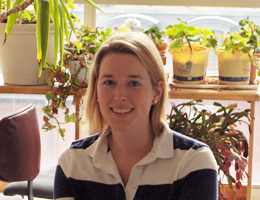National Research Service Award (NRSA) Recipient
 NRSA Recipient – Rebecca Benham –
NRSA Recipient – Rebecca Benham –
An essential aspect of conducting research and research training is funding. Young or budding scientists may vie for grants and awards to complete their predoctoral fellowship. One avenue for these scientists is the National Research Service Award (NRSA), an award dedicated to Dr. Ruth L. Kirschstein who was an accomplished scientist in polio vaccine development and a recognized champion of research training. Rebecca (Becky) Benham, of Boston University School of Medicine, is the recent recipient of the NRSA award. Becky good-naturedly sat down to answer a number of questions about her research and herself.
Q: What PhD program are you enrolled in and why did you decide on this particular program?
A: I am in two programs, Pharmacology and Neuroscience. As an undergraduate student at Hamilton College I studied neuroscience. After graduation in 2005, I became interested in drug research and neurological diseases, which led me to look for a place where I could study both. I think both programs have provided me with excellent educational and research training.
Q: What was the main reason you chose to attend BUSM?
A: I really believed it was important for me to be in an area surrounded by research. There are several Universities and Pharmaceutical companies doing exciting research in the Boston area. Boston University has an incredibly collaborative environment, which is important since it can provide additional opportunities for research and learning.
Q: What is your topic of dissertation and when do you hope to complete your degree and earn your doctorate?
A: The easy questions first. My topic is epilepsy, specifically, looking at changes in GABAA receptor alpha 1 subunit expression that occur in temporal lobe epilepsy. Our lab has identified that BDNF activates a unique signaling pathway that contributes to these observed changes that affect the function of inhibition in the brain. When will I complete my dissertation…well the NRSA grant is for two years, so that is the goal. It may take longer though.
Q: What factors helped you to decide to pursue a career in biomedical research?
A: I really enjoy seeing a project through to the end, to find the answer. I enjoy having a question, designing an experiment, finding an answer, with the hope that the answer may eventually contribute to treating people with epilepsy. Research provides you with an opportunity to better understand an issue, and I enjoy that process, even when it usually leads to more questions.
Q: Can you tell us a little about your background such as your hometown, schools attended, etc.?
A: Sure. I grew up outside of Washington, D.C. in Virginia. I was positive I wanted to be a musician. I played the piano for ten years and I also sang. I didn’t become interested in Neuroscience until my senior year of high school. I had to complete a project on the ‘Mozart effect’. This limited exposure to brain development sparked my interest, and I decided to further pursue neuroscience in college. Once I began doing research I was hooked. My parents didn’t believe I was completely serious until I actually graduated from college. Following graduation I worked in a lab at the University of Maryland for a year studying the effects of the estrous cycle on sleep in rats.
Q: What do you do in your free time?
A: Free time?
Q: Do you have free time? What would you like to do if you did?
A: I spent some time this summer with my family. I enjoy cooking meals at the end of the day and reading when I can. I’m also an avid Washington DC sports fan, so I try to catch a few football, hockey, and baseball games when I can. My husband and I are also hoping to go on our honeymoon soon.
Q: You are married? Congratulations. How long have you been married for?
A: Since August 14th of this year.
Q: Wow, you have a lot going on. What about your plans once you graduate?
A: I am thinking about my options. Once I get some post-doctoral experience, I guess I’ll have to test the waters. I always thought that I would go straight into the industry, but I am realizing my interests in and the benefits of academic research.
Congratulations on both your recent marriage and exciting award. Good luck with your research, we all hope you find the answers you are looking for. With such a positive attitude and excellent capabilities, Becky will have plenty of options as she decides on her future plans.
By GMS student,
Margaret Bailey Wentworth